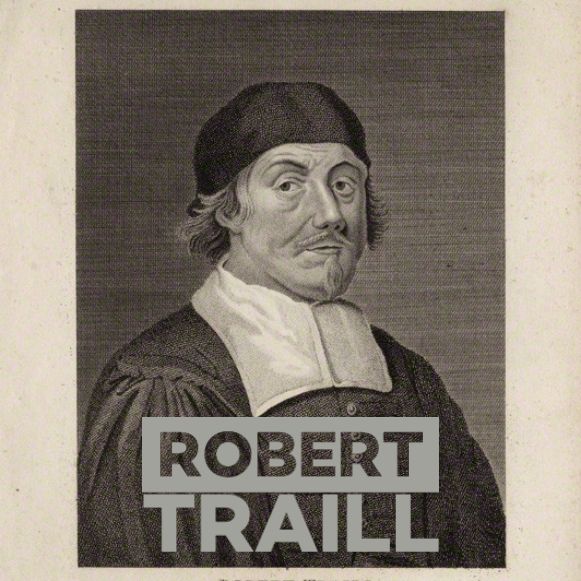Robert Traill (1642–1716) was a minister who experienced persecution from a young age and approached each of his trials with grace. Traill was born in Scotland into the family of a Presbyterian minister. Due to his upbringing and convictions, he stood with the Presbyterian cause pushing back against the Church of England. Traill promoted and advanced true Christianity through the regions of Scotland, England, and Northern Ireland. Due to not aligning with Anglicanism, he and many other Scottish ministers suffered greatly during the later 1600s.
Traill was educated by his father and went to the university of Edinburgh where he excelled in literacy and theology. During his study, he befriended other Puritans such as William Guthrie (1620–1665), the author of The Christian’s Great Interest. In the 1660s, Traill served briefly as a chaplain in Scotland, but that was not to last as Traill had to flee Edinburgh when a banned book was discovered in his home, the book was An Apologetical Relation of the Particular Sufferings of the Faithful Ministers and Professors of the Church of Scotland Since August 1660 by John Brown. In 1666, Traill was accused of being involved in the Pentland Rising, which was seen as Presbyterian ministers who rejected the restoration settlement with Charles II’s additions. Consequently, the Privy Council condemned Traill as a traitor and rebel. Anticipating arrest, he and other British and Scottish Puritans fled to the Low Countries to take refuge. With ongoing pressure from the Scottish monarchy and England Traill settled in the Netherlands and in 1667 he became an assistant to a professor at Utrecht in the Netherlands where he helped prepare Samuel Rutherford’s Examination of Arminianism for publication.
In 1669, Traill settled in London and was installed as a Presbyterian minister in Cranbrook, Kent. In 1677, he visited Edinburgh, preached in a private home, and was arrested for preaching, hosting a gathering, and collaborating with John Welsh. His arrest resulted in many months in prison, and upon his release, his conditions were to “live orderly in obedience to the law” which meant not participating in or hosting religious meetings which went against the state religion. As a result, he returned to Cranbrook.
After the Glorious Revolution (The overthrowing of the Catholic King James II, who was replaced by his Protestant daughter Mary and her Dutch husband, William of Orange), Traill served as co-pastor with Nathaniel Mather (Great Grandfather of Cotton Mather). After Mather’s death, he pastored a separate congregation, which he gathered. In 1692, he took to writing and wrote A Vindication of the Protestant Doctrine of Justification which was to defend the Reformed view of justification, articulate the benefits, and challenge antinomianism (the belief that because of grace Christians are released from any moral obligation of the law). Through the writing process, he was connected with Isaac Chauncy (John Owen’s successor) and the younger Thomas Goodwin, who defended a biblical understanding of justification.
Robert Traill died in 1716, at age seventy-four. He was never married. What historians note about Traill’s life was that he was a Christian pastor with a powerful theological mind, displayed courage under persecution, had a pastoral heart with words that touched the soul, and never shied away from being evangelical. Joel Beeke describes Traill’s exposition of John 17:24 as a “masterpiece of Puritan experiential doctrine.” Even J.C. Ryle benefitted from Traill’s writings as he defended the church against the Holiness Movement by making clear distinctions between justification and sanctification. Recognizing that the doctrine of justification can be attacked from any age, Robert Traill’s book is a helpful resource even today.

